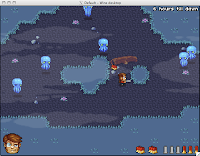
Back in the nineties Apple made some key mistakes: 1. It refused to sell computers over catalogs, even thought it had one (Dell and Gateway took off with this) 2. It messed up the licensing of its operating system and 3. Having a better graphics platform than many PCs of the time it actively discouraged the use of the Mac for gaming.
Now finally gaming is coming of age on the Mac. This year has seen the release of Valve's steam platform for the Mac. Which not only brings Valve's very popular games like Team Fortress 2 (TF2) but also allows cross platform purchasing. If you buy a game like Braid that is available for both Mac and PC you only need to buy it once and you can use it on both Operating Systems (OS).
Arguably the beginning of this period was the smart move by Bioware to release it's popular MMORPG World of Warcraft (WOW) as a Mac and PC release. Now the Mac has become a great gaming platform for most casual and occasional gaming. And Apple has learned it's lesson too, and it's pushing it's new iOS platform for the iPad and iPhone as a gaming platform to rival Sony's and Nintendo's portable offerings.
But what of old PC games? (Or PC-only games?)
There are two great avenues to this: Virtualization and the Wine project. (There is of course dual booting but that's a different beast.)
Virtualization allows you to run a windows OS inside a Mac OS and have been around for a very long time, but now with the arrival of Intel Macs virtualization no longer suffers from the crippling performance hit that made it near unusable for gaming. There are many virtualization offerings for the mac, the most popular are Parallels and VMware.
But virtualization is not the only option. The wine project (Wine stands for Wine Is Not an Emulator) is a open-source projects that opens up the Windows API to Unix based Operating Systems like Linux and OS X. Unlike virtualization which runs the entire Operating System and thus requires a copy of it, Wine merely translates the windows commands and hooks into commands that Mac OS understands, so there is no need to buy a new license.
While Wine in itself can be downloaded for free for Mac, there are commercial distributions of it that allow the non-techie to use it without having the headache of manually configuring it. The two most common ones are Cedega and Crossover. I like Crossover because they develop the open-source version of Wine directly so any money they get, goes to serve the greater open-source community too.
Crossover comes in two flavors: Crossover Office and Crossover Games. Both do the same thing but one comes preconfigured to help you install MS Office and other non-gaming software like Quicken and the other has special tweaks that facilitated the running of games.
Before Steam released its platform on Mac, one could play TF2 on a Mac using crossover games. Now crossover games not only allow you to play games that haven't been ported yet like Left for Dead but also opens up the world of classic gaming on to the Mac. While there were some classic games that were released for the Mac and PC (namely the Myst series) most old games are PC only. Not only does steam have a great library of old games but new services like Good Old Games bring classic games to the new online digital distribution world.
I first became aware of the Wine project through Linux. I even installed WOW on it. But the Crossover implementation of Wine is far simpler to use. It creates separate configuration envelopes that it calls bottles allowing wine to be tailored to the specific program running in it. Not only that, as wine improves so does Crossover, and games that didn't work suddenly do.
Currently I'm an advocate for Crossover, so I'm a bit biased for it, but I think it's worth checking out. However, since programs that run under wine are hit or miss or have varying levels of success it's key you look it up on their database first and then try their free demo before deciding. Some games work great, others run but are unplayable and other don't run at all.
Old games tend to work great, as many of this games have low hardware requirements and a good chance of working under wine. Great classic PC games that I've been able to play through crossover are: Sacred, Indigo Prophecy and Exile.
I don't think that Linux will have the gaming resurgence that is happening with the Mac any time soon, but thankfully Crossover works on Linux too.
Oh I should note that while the crossover packages seem a bit expensive, the best deal is the pro option that gives your both crossover office and crossover games. The renewal of this is half of the normal price for a year. If you get this for a couple of years the upfront cost is not so bad.
ReplyDelete